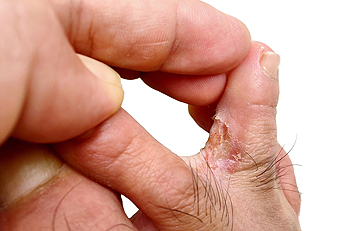Athlete's Foot and and Why It Reoccurs
Tuesday, 10 December 2024 00:00
Athlete’s foot is a common fungal infection that affects the skin on the feet, particularly between the toes. It is caused by fungi known as dermatophytes, which thrive in warm, moist environments like sweaty socks and shoes. The symptoms of athlete's foot include itching, redness, peeling, and sometimes blistering or cracking of the skin. There are different types of athlete’s foot, including interdigital, which affects the spaces between the toes, and moccasin-type, which leads to dry, scaly skin on the soles and sides of the feet. The infection can reoccur because the fungi are resilient and can survive on contaminated surfaces like floors, towels, and shoes. Poor foot hygiene, wearing tight shoes, and exposure to communal areas like gym floors can contribute to repeated infections. Athlete’s foot can be uncomfortable. If you have developed this condition, it is suggested that you promptly schedule an appointment with a podiatrist who can offer prescribed medication for relief.
Athlete’s foot is an inconvenient condition that can be easily reduced with the proper treatment. If you have any concerns about your feet and ankles, contact Dr. Anna Petrov from Family Foot & Ankle Care. Our doctor will treat your foot and ankle needs.
Athlete’s Foot: The Sole Story
Athlete's foot, also known as tinea pedis, can be an extremely contagious foot infection. It is commonly contracted in public changing areas and bathrooms, dormitory style living quarters, around locker rooms and public swimming pools, or anywhere your feet often come into contact with other people.
Solutions to Combat Athlete’s Foot
- Hydrate your feet by using lotion
- Exfoliate
- Buff off nails
- Use of anti-fungal products
- Examine your feet and visit your doctor if any suspicious blisters or cuts develop
Athlete’s foot can cause many irritating symptoms such as dry and flaking skin, itching, and redness. Some more severe symptoms can include bleeding and cracked skin, intense itching and burning, and even pain when walking. In the worst cases, Athlete’s foot can cause blistering as well. Speak to your podiatrist for a better understanding of the different causes of Athlete’s foot, as well as help in determining which treatment options are best for you.
If you have any questions please feel free to contact one of our offices located in Wheeling and Chicago, IL . We offer the newest diagnostic and treatment technologies for all your foot and ankle needs.







